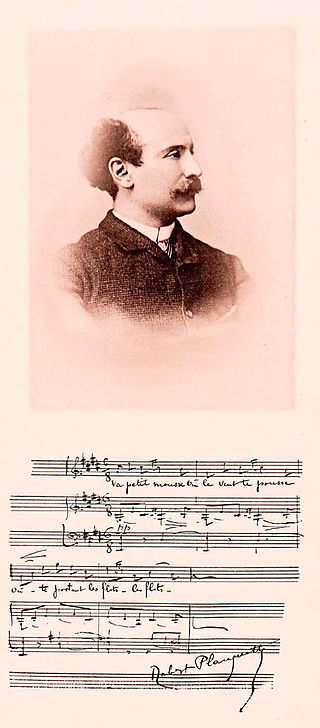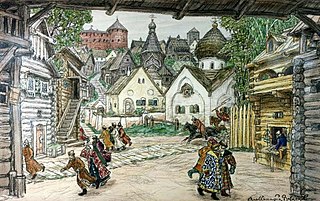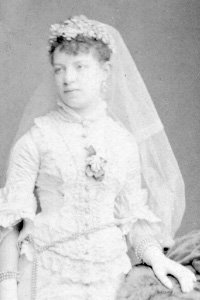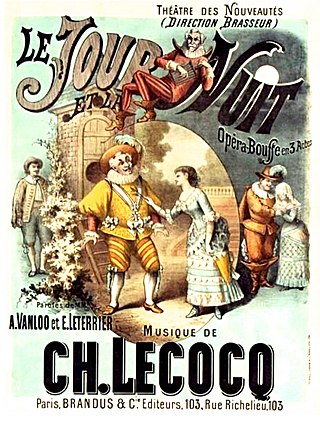
Jean Robert Planquette was a French composer of songs and operettas.

The Sorcerer is a two-act comic opera, with a libretto by W. S. Gilbert and music by Arthur Sullivan. It was the British duo's third operatic collaboration. The plot of The Sorcerer is based on a Christmas story, An Elixir of Love, that Gilbert wrote for The Graphic magazine in 1876. A young man, Alexis, is obsessed with the idea of love levelling all ranks and social distinctions. To promote his beliefs, he invites the proprietor of J. W. Wells & Co., Family Sorcerers, to brew a love potion. This causes everyone in the village to fall in love with the first person they see and results in the pairing of comically mismatched couples. In the end, Wells must sacrifice his life to break the spell.

Achille Edmond Audran was a French composer best known for several internationally successful comic operas and operettas.

Alfred Cellier was an English composer, orchestrator and conductor.

The Mountebanks is a comic opera in two acts with music by Alfred Cellier and Ivan Caryll and a libretto by W. S. Gilbert. The story concerns a magic potion that causes the person to whom it is administered to become what he or she has pretended to be. It is similar to several "magic lozenge" plots that Gilbert had proposed to the composer Arthur Sullivan, but that Sullivan had rejected, earlier in their careers. To set his libretto to music, Gilbert turned to Cellier, who had previously been a musical director for Gilbert and Sullivan and had since become a successful composer. During the composition of the piece Cellier died, and the score was finished by the original production's musical director, Ivan Caryll, who became a successful composer of Edwardian Musical Comedy.

The Oprichnik, also translated as The Guardsman, is an opera in 4 acts, 5 scenes, by Pyotr Ilyich Tchaikovsky to his own libretto after the tragedy The Oprichniks by Ivan Lazhechnikov (1792–1869). The subject of the opera is the oprichniks. It is set in Ivan the Terrible's court during the oprichnina times (1565–1573).

The Voyevoda, Op. 3, is an opera in 3 acts and 4 scenes, by Pyotr Ilyich Tchaikovsky with a libretto written by Alexander Ostrovsky and based on his play The Voyevoda .

Dorothy is a comic opera in three acts with music by Alfred Cellier and a libretto by B. C. Stephenson. The story involves a rake who falls in love with his disguised fiancée.

The Enchantress is an opera in four acts by Pyotr Ilyich Tchaikovsky based on the libretto by Ippolit Shpazhinsky, using his drama with the same title. The opera was composed between September 1885 and May 1887 in Maidanovo and was first performed in Saint Petersburg in 1887.

François Arsène Cellier, often called Frank, was an English conductor and composer. He is known for his tenure as musical director and conductor of the D'Oyly Carte Opera Company during the original runs and early revivals of the Savoy operas.

Rip Van Winkle is an operetta in three acts by Robert Planquette. The English language libretto by Henri Meilhac, Philippe Gille and Henry Brougham Farnie was based on the short stories "The Legend of Sleepy Hollow" (1820) and "Rip Van Winkle" (1819) by Washington Irving after the play by Dion Boucicault and Joseph Jefferson.

Henry Brougham Farnie, often called H. B. Farnie, was a British librettist and adapter of French operettas and an author. Some of his English-language versions of operettas became record-setting hits on the London stage of the 1870s and 1880s, strongly competing with the Gilbert and Sullivan operas being played at the same time.

Giulia Warwick was an English opera and concert singer and professor of music in the last quarter of the 19th century. She is best known for roles with Richard D'Oyly Carte's Comedy Opera Company and with the Carl Rosa Opera Company.

La fille du tambour-major is an opéra comique in three acts, with music by Jacques Offenbach and words by Alfred Duru and Henri Chivot. It was one of the composer's last works, premiered less than a year before his death. It opened at the Théâtre des Folies-Dramatiques, Paris, on 13 December 1879, and, after a successful initial run, was frequently revived in Paris and internationally, but in recent times has not been among the Offenbach operas most frequently staged.

Furneaux Cook, born John Furneaux Cook, was an English opera singer and actor best known for baritone roles in the comic operas of Gilbert and Sullivan and Alfred Cellier on the London stage. Cook appeared on stage for over 30 years in London, the British provinces and America.

Lionel "Lal" Brough was a British actor and comedian. After beginning a journalistic career and performing as an amateur, he became a professional actor, performing mostly in Liverpool during the mid-1860s. He established his career in London as a member of the company at the new Queen's Theatre, Long Acre, in 1867, and he soon became known for his roles in Shakespeare, contemporary comedies, and classics, especially as Tony Lumpkin in She Stoops to Conquer.

Surcouf is a French opéra comique in three acts and a prologue, music by Robert Planquette, libretto by Henri Chivot and Alfred Duru, premiered on 6 October 1887 at the Théâtre des Folies-Dramatiques in Paris. It ran for a modestly successful 96 performances.

Le jour et la nuit is an opéra-bouffe with a libretto by Albert Vanloo and Eugène Leterrier and music by Charles Lecocq. It was first performed in Paris in 1881, ran for 193 performances and was subsequently staged at other theatres in Europe, North America and Australia. It has not remained in the regular international operatic repertoire.

Le grand mogol is an opéra bouffe with music by Edmond Audran. The opera depicts the love between an Indian prince and a young Parisienne, and the unsuccessful attempts of conspirators to thwart their romance.

The Sultan of Mocha is a three act comic opera of 1874 with a libretto by Albert Jarrett and a score by Alfred Cellier. It was first produced at the Prince's Theatre, Manchester in 1874 and revived in London in 1876 and 1887 and in New York in 1880, among others.





















